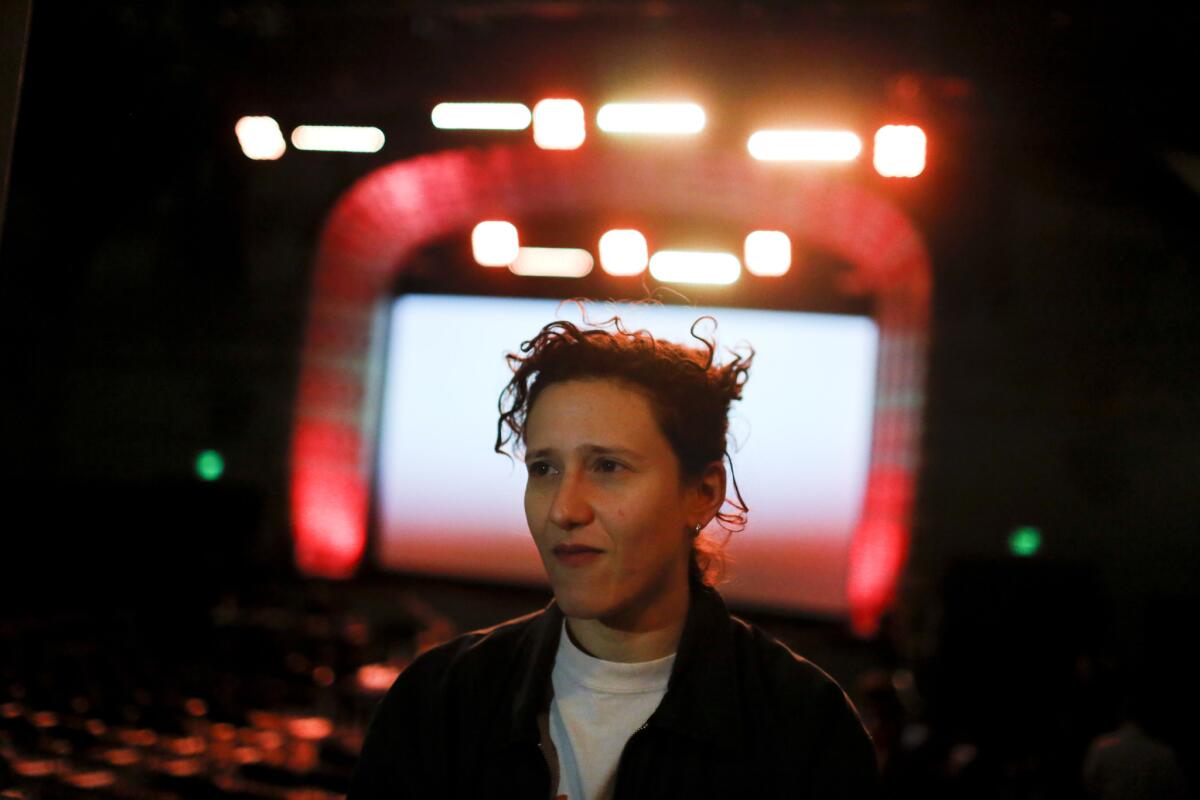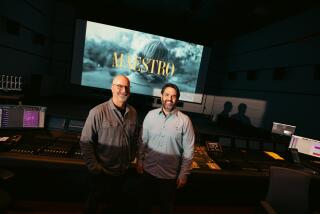Review: Mica Levi and orchestra go truly ‘Under the Skin’ at the Regent

Mica Levi’s score for “Under the Skin,” the eerie 2013 film about alien seduction, leaves more of a sonic imprint than the voice of the unnamed protagonist who guides the action. The young British songwriter-composer, known to pop audiences through her group Micachu & the Shapes, gave life to that work on Tuesday night when she conducted her tense, minimal music alongside the Jonathan Glazer-directed film at the Regent Theater in downtown Los Angeles.
While the film’s mysterious creature, inhabited with blank-slate disaffection by Scarlett Johansson, explored the Scottish countryside and its random randy men, Levi guided the 24-piece Wordless Music Orchestra through ever-morphing sheets of woozy, unsteady strings and the occasional synthetic drum tone. The orchestra, based in New York, explores music made at the intersection of classical and contemporary instrumental music. Up above, Johansson’s character didn’t say much; Levi and Wordless reveled within that silence.
------------
For the record, 11 a.m. Jan. 9: The review of Mica Levi’s performance of her score alongside the film “Under the Skin” neglected to mention the participation of members of Wild Up. The Los Angeles-based modern music collective collaborated with Levi and the Wordless Music Orchestra during both of Tuesday night’s screenings.
------------
In the crowd, film sophisticates and lovers of movie music who moments earlier had been talking shop -- the underappreciated early work of film composer Howard Shore, for example -- absorbed a rare opportunity to experience a movie with its score taking center stage. (Or more accurately, beneath the stage, with the conductor facing the orchestra and the screen.)
Volumes of violins, violas, cellos and basses bent notes as a stoic speeding motorcyclist cut across the vast Scottish countryside. A submerged, boneless body burst to a percussive pop and shattered strings. Silence was stabbed by footsteps, of revved engines, of a bawling baby abandoned on a beach, of our heroine cruising Glasgow and absorbing the world.
Unresolved tones reached calming resolution as the story unfolded. Warmth supplanted coldness, then circled back. A creeping wave of bass, cello and tom-tom drifted in from nowhere, only to fade away.
Glazer is an expert at nothingness and the ways in which music can punctuate it. Before making feature films, he earned his reputation as a music video director through work for Radiohead (“Karma Police”), Massive Attack (“Karmacoma,” “Live With Me,”) Nick Cave, Blur and others.
With his raw, guttural feature-length debut, “Sexy Beast” in 2000 and 2004’s under-appreciated creep-fest “Birth,” the British director proved himself devoted to tough, penetrating stories. His sparse scores have become one of his stylistic strengths.
Oscar-nominated composer Alexandre Desplat’s work on “Birth” employed a vastness similar to “Under the Skin,” one in which each unspoken sound seemed surrounded by tundra. Though “Birth,” which starred Nicole Kidman as a widow whose husband seems to have been reborn in the form of a prepubescent boy, never found an audience, its score lingers and continues to resonate. (For years it’s been used as NPR bumper music.) I still listen to it often, and expect I’ll do the same with Levi’s “Under the Skin” recording.
Glazer’s musical choices are seldom manipulative and are often counterintuitive. For “Under the Skin,” in fact, Levi leaned toward studied ambivalence, commenting with untethered tones as if in vacant disbelief, filling strings, synths, flute and percussion with an uncentered energy. Trained in composition at the Guildhall School of Music & Drama in London, she led with a measured confidence of a composer decades older than her late-twentysomething age.
She guided tom-tom drums tracing patterns as men were led to their eventual demise. Snares and cymbals were mostly absent; much of the upper range tones arrived through bowed strings. Huge swaths of the film lacked any music whatsoever.
The Regent, it should be said, was hardly the ideal venue for this endeavor. Recently renovated to house an excellent new music venue, its acoustics wreaked havoc on the film’s dialogue. Pity the poor attendees who had never seen the film and had to make sense of the thick Scottish brogue uttered throughout. Amid all the echo, vowels vanished and mumbles reigned. It didn’t help that the Regent’s bar is within the theater, so clanging glasses and ice cubes co-soundtracked some of the film’s first act.
Those petty annoyances, though, subsided, and what remained, literally, was Levi’s music. Even now, as I write the morning after, a tense three-note string series is looping in the head as an ear worm. It feels like something terrible is about to happen, something involving an abandoned space, a darkened hallway and a pool of unknown fluid that traps desirous men.
If anyone notices me wandering toward an emotionless woman while a subtle beat thumps, please alert the authorities. Don’t, however, tell my wife that I followed this unknown other and her beguiling music into the abyss.
Follow Randall Roberts on Twitter: @liledit
More to Read
The biggest entertainment stories
Get our big stories about Hollywood, film, television, music, arts, culture and more right in your inbox as soon as they publish.
You may occasionally receive promotional content from the Los Angeles Times.







